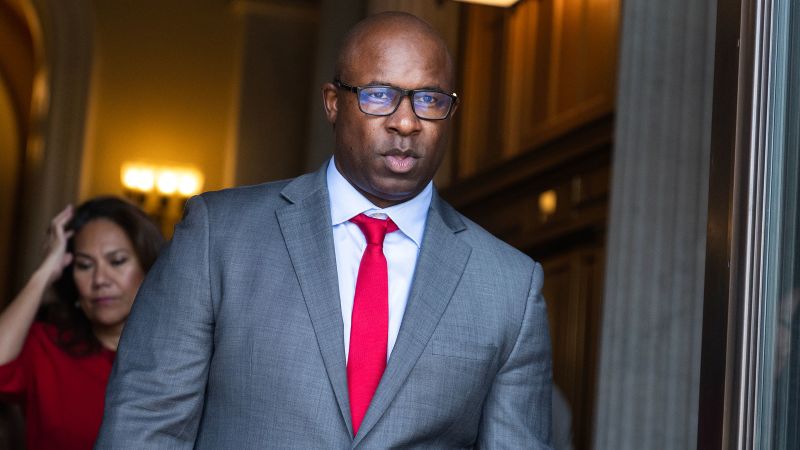The House voted on Thursday to censure Democratic Rep. Jamaal Bowman of New York for triggering a fire alarm in a House office building when there was not an emergency.
Censure amounts to a significant rebuke of a member of Congress, though it does not carry an explicit penalty beyond a public admonition of a lawmaker and is not as severe as expulsion.
Censure is typically a rare move by lawmakers, but Republicans have led efforts to censure two other Democrats since June. Bowman is the third censured since the GOP took control of the chamber.
Bowman was caught on tape pulling a fire alarm in the Cannon House Office Building in late September, shortly before the House was scheduled to vote on a government funding bill. The building was subsequently evacuated. The congressman said following the incident that it had been an accident.
“I was trying to get to a door. I thought the alarm would open the door, and I pulled the fire alarm to open the door by accident,” Bowman said at the time, adding: “I was just trying to get to my vote and the door that’s usually open wasn’t open, it was closed.”
In October, Bowman was charged by the DC attorney general over the incident and subsequently pleaded guilty to a misdemeanor charge for falsely triggering a fire alarm in a House office building.
Republican Rep. Lisa McClain of Michigan put forward the resolution to censure Bowman, saying on X, “Nobody is above the law, Congressmen included.”
According to the resolution, if the House votes to censure Bowman he must present himself in the well of the House where they will read out the censure notice.
“Representative Jamaal Bowman will forth with present himself in the well of the House of Representatives for the pronouncement of censure,” the resolution states.
Bowman and other Democrats have spoken out against the censure effort.
“It’s painfully obvious to myself, my colleagues, and the American people that the Republican Party is deeply unserious and unable to legislate. Their censure resolution against me today continues to demonstrate their inability to govern and serve the American people,” Bowman said on the House floor Wednesday.
“The legal process on this matter has played out. In no way did I obstruct official proceedings … Unfortunately, Republicans are here trying to rehash an already litigated matter,” the congressman said, saying that he “took responsibility and accountability for my actions and plead guilty.”
On Wednesday, the House voted down a Democratic motion to table – or block – the resolution by a tally of 201 to 216, setting up a final vote over the censure on Thursday.
The censure resolution will come to the floor less than a week after the House voted to expel indicted GOP Rep. George Santos of New York – the most severe form of punishment for a member. That vote brought an end to a scandal-plagued and tumultuous tenure on Capitol Hill for the freshman congressman. Expulsion is exceedingly rare and requires a two-thirds majority vote to succeed – a high bar to clear.
The Republican-controlled House has brought censure resolutions against other Democratic lawmakers as well.
In November, the House passed a GOP-led resolution to censure Rep. Rashida Tlaib of Michigan over comments critical of Israel and in support of Palestinians amid Israel’s war against Hamas.
Tlaib defended herself, arguing that the censure was an effort to silence her and saying that her “colleagues have resorted to distorting my positions in resolutions filled with obvious lies.”
In June, the House voted to censure California Rep. Adam Schiff, a key lawmaker in Democrats’ congressional investigations into former President Donald Trump during his presidency.
Ahead of the vote, Schiff called the move “a badge of honor” and said, “They wouldn’t be going after me if they didn’t think I was effective.”
This story and headline have been updated with additional developments.
CNN’s Hannah Rabinowitz contributed to this report.
Read the full article here





